Drauma

A 1596 sketch of a rehearsal in progress on the thrust stage of The Swan, a typical circular Elizabethan open-roof playhouse
"We somehow seem to stumble into happy accidents, anyway."
Any change, even HeadingHomeward, will most likely introduce both some drama and at least a little trauma into a life: Drauma. My father forever wondered why people could not just leave well enough alone, for he'd come up through a Draumatic childhood. Then he married my mother who, though perhaps not at first a fully fledged drama queen, at the very least certainly qualified as a drama princess. Full queenship followed. He never escaped the sturm und drang, however much he might have preferred an alternate experience. There was always, always, always something threatening domestic tranquility, though, gratefully, usually little more than minor soap opera productions. He'd just be settling in for the evening, kids finally on the way to bed, when my mom's cousin would stop by to see his favorite cousin BonBon, upset the stabile force field, and maybe fall off the front porch in the process. My dad despised upsets though he never managed to shake their intrusion.
I'm little different. I much prefer the old status quo which, if only because of its aging status can never hold on for nearly long enough to fully satisfy me.
Carping

A Song dynasty painting attributed to Liu Cai: Fish Swimming Amid Falling Flowers (circa 1080–1120)
"No need to affect superior airs, for those suspend nothing really worth caring about."
Criticism seems to have overtaken plagiarism to become the latest sincerest form of flattery. In a world obsessed with attracting clicks, with drawing attention to itself for fun and profit, Carping has grown to become the primary export of each of this world's key economies. Once renowned for our wheat exports, The United States now primarily trades in agricultural-grade Tweets reeking of primitive fertilizer, each year producing formerly unthinkable volumes. Other than complaining while ignoring underlying difficulties, we've forfeited our farm economy to attend to the one activity certain to inflict the greatest harm on ourselves, we point out each others' shortcomings in lieu of tolerating or lending a hand. We deal exclusively in picking at low-hanging fruit, for why bother with hauling out ladders and stretching if we might might more conveniently savage whatever's already ready to hand? We discount each other better than even the biggest discount retailer slashes product prices. Once proud peoples have become simply whiny.
It's always, obviously, the wrong frickin' glass, whether half empty or half full.
GrowingInto
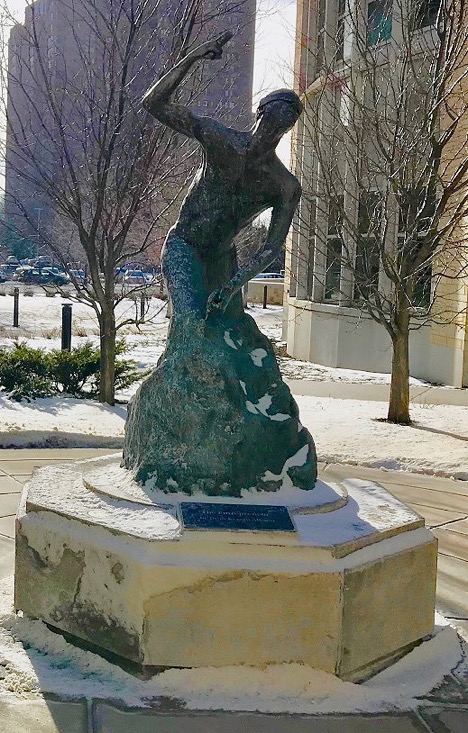
Kermit Allison: `The Entrepreneur’’
This sculpture depicts a blindfolded man chiseling himself out of a stone block. I wonder how he managed to chisel his hands into existence.
"It's exhausting, but it's a living."
Whatever else I might characterize myself as, unfinished properly summarizes my progress so far. I don't remember starting. I apparently awakened sometime later, my forward momentum already inexorable by then. I carried this marvelous property. I could sense space beyond me and propel myself toward it. This ability left me seemingly trailing a little behind myself, attempting to catch up. By the time I arrived there, though, another attraction had arisen in the distance and I would be heading off in that direction for a change, always changing. I grew to sense that I never quite arrived, with each arrival quickly becoming a fresh departure. I eventually abandoned any sense that I might eventually catch up to myself, accepting that I might well always find myself lagging a little behind. I can't quite capture the motion or the presence due to some delay in my capturing mechanism. I chronicle where I was, never where I am, because I'm never quite wherever I might be at any moment. I'm still GrowingInto.
Acknowledging this apparently essential disconnect seems fundamental to maintaining some semblance of sanity.
Changered

Marinus van Reymerswaele: The Moneychanger and His Wife (1539)
"Life might only make sense if it's surprising us."
Change arrives like a thief in the night. However well-planned anyone thought they'd "made" it, actual change always comes on its own terms. It will surprise regardless of anyone's beforehand anticipation. I think of this apparently inevitable effect as Changered, using the form it shares with conjured and snookered. It's always essentially a change-up following a carefully crafted series of ascending fastballs. It sets up the batter to fool himself, the wounded yelp following the umpire's call just further evidence, just as if we needed any, that difference respects nobody's patterns, nobody's model. We might eventually enjoy Changered's benefits, but initially it will seem to have taken mean advantage of us.
Remember when our recently formered President first took office? The shift jarred.
Won'ts
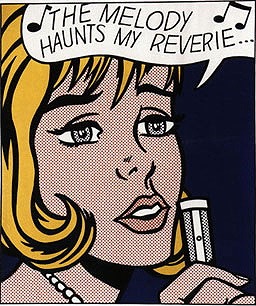
Roy Lichtenstein: Reverie (from the portfolio 'Eleven Pop Artists, vol. II') (1965)
" … nearer the center of MY universe where gravity just works right …"
I suspect that even a moderately skilled artist could create a near perfect portrait of me by merely portraying all I won't do, the image created out of essentially negative space. In my inhibited early youth, I maintained a long list of won'ts, and I didn't even consider myself to be that picky of an eater. Later, I set about relaxing my code and for a time became somewhat of a permissive libertine, agreeing to engage in some things apparently just to learn why I shouldn't. I learned better. Now, I've settled into what I consider to be a balanced existence, comfortable in my convictions buttressed behind strong defensive walls, My Won'ts serve as my castle, complete with parapets and banners. Mark Twain posited that the primary difference between a human and a jackass is that there are some things a jackass just won't do; they're stubborn. I think of myself as living toward the jackass end of the species spectrum, stubborn after a fashion, for I scrupulously maintain my Won'ts as both moral and ethical imperatives.
Moral imperatives include all those things others told me that I should not want.
Lightenings

Jules Tavernier: 'Sunrise Over Diamond Head' (1888)
"Life sure seems foggy this morning."
Some days I seem incapable of accomplishing anything. The following day, I might notice a definite Lightening as whatever weight encumbered me evaporates. I suppose that this most curious property isn't exclusive to me. Perhaps it's tied to some circadian emotional thing. Lincoln recalled that some days a black dog would visit him and lay him low, then a certain Lightening would overwhelm the gloom to reopen possibilities denied him just the day before. These visits remained unpredictable, never foreseen. On any given day he might be fully capable or essentially incapacitated, he never knew beforehand. Him being famous and all, I guess that his swings might carry more weight than mine, but I'm similarly unreliable. Back when I was charged with estimating project efforts, I wondered how I might account for this perhaps most human of qualities, for elements other than raw skill entered into accurately foretelling. The best contributor on a bad day couldn't quite compete with the worst on a good day, but I never found a way to pre-determine when any rhythm might overtake anyone. I stuck with an imaginary average instead, figuring everything would probably even out in the end, which it almost never did.
Yesterday, a Lightening visited.
BigBaby

Fernando Botero – Mona Lisa, Age Twelve (1959)
"Look, I tied my own shoes this morning!"
Adulthood brings more opportunities for me to behave like a BigBaby than I ever enjoyed as an actual infant. Strict parents continually encouraged me to act more maturely than my age, so I figure that I used up some of my grown up behavior well before I reached puberty, which left adequate untapped reserve to keep me in decent stead through to the very edge of my dotage. Unfettered by hovering parents, my inner BigBaby has increasingly flourished, gaining what I consider to be near master status in my sixties. Never much of a fit pitcher, I rarely rage, but I excel in the slow walk procrastination competition and my petulance has never been better formed. With all humility, I sense real mastery in my performance of the always irksome disappearance routine. With my well-developed adult intuition, I can almost always sense when a quest for assistance begins and I cleverly seem to disappear just before it finds me. I've also worked on my sorry face for later, when I learn that if only I had been available, I could have proved useful. Cruel fate, huh?
I might shine most brightly when undermining myself.
AlienatingAffections
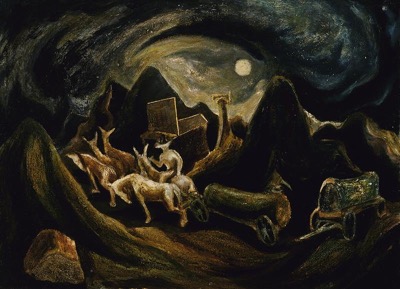
Jackson Pollock: Going West (1934-35)
"Let the record show that I came to genuinely love this place …"
HeadingHomeward induces a perhaps necessary hardening of the heart toward this place I'm leaving, even though my relationship with this place has always been a forced marriage. It was not anything like the sort of place in which I'd ever imagined living. My first impression caught me wondering if I'd actually been reduced to living in something like this. It was way too new for me, stylistically strange and curiously laid out; ceilings too high and yard too narrow. The views seemed fine, even extravagant, though one does not inhabit views, or so I told myself. I told The Muse that I could see myself living here, though I really couldn't. Not then, but we'd been searching for someplace to live for six discouraging weeks, we'd only seen variations on worse, mostly much, much worse. I was ready to be finished searching and in light of then present conditions, this place seemed good enough. I told myself that our commitment wouldn't be forever. We both knew we'd be moving on in five years or so, so we settled. Forever.
Settling involves accumulating small affections.
Asymptoting
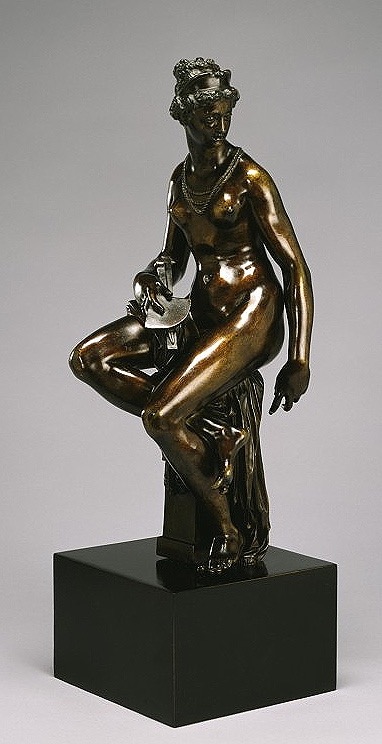
Jean Boulogne [Giambologna]: Allegory of Architecture (ca. 1580; Cast: 18th century)
"Our future must remain in the future tense to make any sense at all."
I claim to be HeadingHomeward while I might more descriptively insist that I'm Asymptoting there, but Asymptoting sounds like another one of my made up words, one of those requiring further explanation. I won't mind explaining if you can bear to listen to my blathering. You see, Heading connotes a more definite direction and a more certain destination than my present adventure wants. I hold a general direction in my head, but it's really little more than an intention yet. Likewise, my destination seems tenaciously uncertain. Oh, I have a specific address in mind, but mere location hardly a destination makes. Aspiration might better describe the direction I'm heading, more feeling than anything, so I consider myself Asymptoting, after that geometric concept of a trajectory unlikely to ever find its target. An asymptote, as you doubtless already know and which I'll explain just to remind myself, is a not necessarily straight line destined to move ever closer to its destination as it lengthens, but often an arc or curve certain to never actually arrive there. Over time, it might well manage to move close enough for most intents and purposes, but it will most certainly never actually arrive.
Why be so picky about making this distinction? I'll explain by referencing Eric Hoffer, the longshoreman philosopher, who insisted that only fundamentally unachievable objectives ever manage to become transformational.
Betterings

JR, the Parisian artist, made the iconic Louvre pyramid disappear 2016, but only for a weekend installation.
"I learned again, but I doubt that I'll remember."
I'm not tumbling into cynicism when I suggest that every attempted step forward tends to first feel like a step backward. Improvements, however aggressively pursued, seem to require some time to manifest, however urgently desired. It might even be true that greater urgency tends to slow down a desired manifestation, often first producing frustration instead. Once envisioned, a novel objective appears much closer than it ever turns out to be. Foresight transports the mind but not the body, unfortunately. I too easily over-inflate my expectations. I reach for some alluring star before gravity steps right up to remind me who and where I are. Dammit!
I might imagine that I would eventually outgrow these childish expectations about Betterings, but this old dog continues to tumble into his oldest trick, which suggests I will probably not be maturing very much beyond where I started on this issue.
Lielessness

Jean-Baptiste Oudry: Ragotin lie par les parents du fou (1727)
"I feel as though I’ve just come home after an overly-extended absence."
I suspect that everyone knows the experience of living a lie. For me, a deep longing accompanies these times as I watch others apparently living their truths seem so damned free. Unencumbered by any haunting sense that someone's going to catch on to them, they seem untroubled even when engaging with difficulties, while I carry considerably more overhead. The lie's like a colicky baby, always fussy and rarely at rest, demanding that I attend to it. I nurture it because I simply must. It eats half my lunch and the world seems cruel and unjust. I render myself a second- or third-class citizen, relegated to entering and exiting like a sneak thief always attempting to get away with something that rightfully belongs to someone else. I, myself, feel like I'm someone else beside myself.
Liberation might come but only ever at the price of doing an utterly unthinkable, something more likely, it seems, to do me in rather than resolve anything.
LooseTalk

Allart van Everdingen: The Bear Distracted with Talk of Honey, (c. 1645-1656)
"Some adults never grow up."
In my youth, I was prone to embellish my stories. I won't deny that vestiges of this tendency remain, but I prefer to think that I've learned something in the interim. I monitor my talk more closely now, and though The Muse will certainly attest to the fact that I'm not above the occasional whopper, I tend to launch them in jest rather than in pre-emptive self-defense. My experiences, I'm slowly becoming convinced, might just be good enough as they sit. I'm more apt these days to play down my role than headline it.
As a direct consequence of my earlier embellishments, I've suffered considerable embarrassment, which I prefer to believe has justifiably humbled me a bit.
Migration
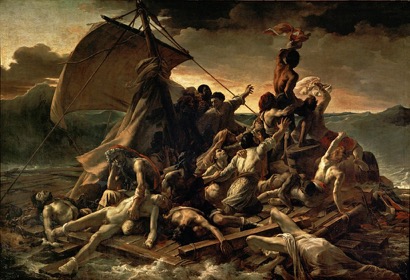
JEAN LOUIS THÉODORE GÉRICAULT - La Balsa de la Medusa (1818-19)
"Migrations seem mostly uphill …"
I expected to post no new HeadingHomeward Story today because I'm migrating between machines. After 15 hours in migration so far, I finally received feedback about expected remaining duration: 3.5 more hours. I cannot predict how or whether this attempt (4 or 5, I've lost count) will work. I'm assuming that it will stall like the prior attempts have stalled without providing any information about progress achieved. Based upon experience so far with Apple's automated Migration Assistant and a painful perusal of the destructions for affecting a "clean install", I'm not hopeful about ever successfully completing this migration. (The "clean install" instructions are incoherent and uninterpretable.) I dare not update my blog before completing the full migration, since that would put myself out of synch with one of my alternate selves, which would produce further complications including another identity crisis. Further complications or identity crises I do not need.
Rest assured that Apple continues to live in blissful ignorance of how their computers are actually used while continuing to make them ever more similar to their dreaded old adversary the meager PC.
Cornspiracy
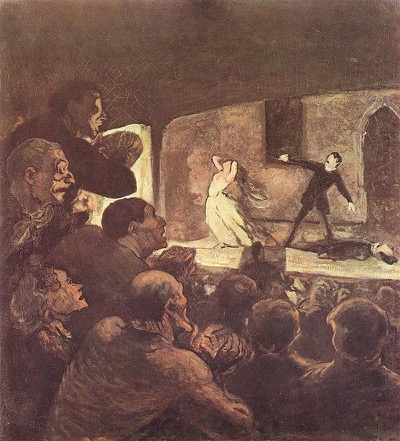
Honoré Daumier: Mélodrame (circa 1856-1860)
"We reap whatever we plant."
The media almost exclusively refers to them as theories, though there's almost nothing theoretical about most of them. Few seem structured following any framework even distantly borrowed from proper theory form, which, I guess suggests that whomever came up with them was not studied in the sciences or liberal arts, probably not very studied at all other than, perhaps, in persuasive rhetoric. No harm or foul for that infraction, though they tend as a result to make little sense, except to those for whom they apparently don't need to make sense to gain their acceptance, those who parse for attraction rather than cogency. These—I'll call them Cornspiracies—might be only what their followers want to believe, their crafters caring little about any underlying coherence or factual basis. Millions have apparently scrambled in line behind them, armies of True Believers following fallacious facts, utterly convinced of their righteousness. Many seem to have taken up arms to overthrow oppressors who never were and never could have been. What do we do with them?
They say that they find it particularly annoying when non-believers talk down to them as if they were stupid.
Walled

Jean Fouquet: The Conquest of Jericho. Illumination, dated c. 1470-1475
"Until there's juice, it's just no use. One good excuse's enough."
I titled the third chapter of my best-selling The Blind Men and the Elephant (Berrett-Koehler 2003) The Wall, but apparently half a lifetime studying and teaching about The Wall didn't predispose me to recognize its presence when I encountered it again. In my book, I explained that every undertaking encounters The Wall at some point, and The Wall seems to swipe motivation for engaging. A physical barrier isn't usually the source of this difficulty, so it can prove tricky to diagnose and resolve the blockage. I suggested in the text that purpose might be flagging and in need of some renewal to produce a juicier sense of anticipation. For me, a new opportunity most often manifests as an almost (or even actually) overwhelming string of impending obligations, and that, if I chase after the result, I'm suddenly conscripted to fulfill every damned one of them. I see a stream of exhausting efforts rather than my heart's desire manifesting before me. Most adventures look more like chores than opportunities once the initial Utopian conceiving's dissipated, and sometimes, reimagining purpose can cause that emotional barrier to crumble.
As with most information, knowing about The Wall doesn't inoculate anyone against encountering it and also contributes little to helping anyone recognize when they're in the presence of it.
Cynic-ism

Salvator Rosa: Diogenes searching for an honest man (mid-17th century)
"The cynic unerringly sees what's missing and misses what's right there awaiting recognition."
I have long held as a personal ethical responsibility the obligation to know enough to justify cynicism while steadfastly choosing not to become cynical. Maintaining this balance seems increasingly difficult, as the older I become, the more familiar I've become with entropy in action. In my relative youth, entropy seemed more theoretical than practical. The 1950s seemed far more futuristic and fresh than its shopworn post-millennium counterpart seems today. Twenty years into this once new century, the future seems considerably less promising and our mistakes much more encumbering. I suppose innocence started abandoning me in earnest after I crossed fifty. The experience haphazardly replacing innocence seems less sturdy and hopeful. I admit to knowing ever more of what might reasonably render me cynical, yet I persist in my insistence that I avoid becoming a cynic. I'm no cynic yet.
Yet I admit to peering out into this world with an increasingly skeptical eye.
BetterAngels

Ignacio de Ries: Saint Michael the Archangel (1640s)
"I intended better than I will likely receive."
Everyone carries one act on their shoulders forever, one irrevocable fart they innocently let which pretty much misdefines their legacy forever. For our widely-esteemed sixteenth President Abraham Lincoln, I suspect that his act invoking "better angels" into his first inaugural speech might justifiably forever generate his remorse for having brought that phrase prominence, though he apparently swiped it from Shakespeare's Othello. I imagine him blushing whenever it's invoked, wherever he is. Note that he made this comment innocently. He could not have been aware in that moment that he'd just birthed his legacy, forever after remembered. He'd, you'll no doubt recall, surreptitiously sneaked into Washington to deliver that speech, dogged by threats of assassination from angry southern white supremacists, the Proud Boys of his time. His losing opponent was one of those self-promotive personalities prone to do little in office who had aligned himself with a party too distracted by self destruction to garner a majority in the election. Since, venomous politicians have invoked Lincoln to encourage their political foes to find reason and come over to their dark side, often appending mumbles referencing "malice toward none" and likewise. The phrase "better angels" has become a not very subtle tell of some worser angels working overtime behind the scene, an invocation meaning pretty much the opposite of what it seems, more taunt than invitation.
I'm uncertain if I subscribe to the whole medieval notion of better and worser angels.
Wending

Ercole de’ Roberti: The Miracles of St Vincent Ferrer (1473)
"… We might just be setting ourselves up …"
The pathway between any two places never runs in anything even vaguely resembling a straight line, yet in my mind, when I envision a journey, I seem only capable of imagining straight-ish lines. My experiences, then, diverge from my plans, continually surprising me. This result probably has most to do with a personal limitation, not precisely a lack of imagination, but a limited one, and the inherent difficulty of plotting curves using only straightedges. I thought I'd long ago immunized myself against shock or surprise when encountering these divergences, but I apparently had not. They get me pretty much every time.
My "discovery" that nobody ever appreciates an accurate plan marked a huge leap in my maturing as a project manager.
LongDivision

Raphael: The School of Athens fresco, Cropped Image of Pythagoras (1509)
"… our well-being might more depend upon how well we divide."
The Muse and I tried listening to the radio as we drove back home following the 9/11 attacks. We'd been setting up for another workshop at The Los Alamos National Laboratory when the news started filtering in. The participants at first opted to continue with the session, since we could do nothing about those distant events, but shortly thereafter, armored Humvees with mounted fifty caliber machine guns began circulating through the streets and orders came down for everyone to evacuate the mesa. We cowered overnight with friends before the rental car agency extended an offer for us to just drop off the car at the airport we'd flown out from a few days previous, waving the usual drop charges. The radio, sometimes a useful distraction on long drives, proved discouraging then. In lieu of the news we'd hoped to receive, only propaganda spewed, the most vile and vindictive speech, saber-rattling on steroids. We quite understandably wondered what country we were passing through.
That evening, we overnighted in Mt. Crested Butte, Colorado, the town where The Muse and I first met.
TrueBeliefers

Michelangelo: Libyan Sibyl (circa 1511)-from the Sistine Chapel ceiling
"I know almost for certain that greater belief won't resolve this one."
I've been reading (finally) Eric Hoffer's The True Believers, a remarkable read that has sat on my dustier library shelf for thirty or more years. I'd occasionally take it down to search for some quip which I intended to use to bolster some argument, but had never sat myself down to plow through the actual content from cover to age-stiffened cover. The front cover detached itself when I opened it, so I've been using it as my bookmark, for I've been pausing frequently, since the prose seems the rough equivalent of heavy cream. One might be well-advised not to chug anything with the consistency of heavy cream, but to swallow it following demure sips, savoring it, and letting it slowly sink in. The author was a San Francisco longshoreman and was in his time a much-revered everyman philosopher, though he hardly qualified as an everyman. Between age five and fifteen, he was blind, an affliction that came and eventually went without explanation or diagnosed cause. He therefore missed his primary education. Shortly after regaining his sight, he lost both parents and set out on his own, wisely choosing to leave New York for California, where he figured at least the weather might suit him. He worked as a migrant farm laborer, being uneducated and all, though he carried a pocketful of library cards he'd collected as he moved between crops. Longshoring amounted to upward mobility, for he could settle down and engage in his heart's passions, studying and writing, when he wasn't laboring.
The True Believer reads as if it was penned by a self-educated man, with wide references to ancient texts few colleges delved into even then.
Rumurmuring

Artemisia Gentileschi: Susanna and the Elders (1622)
"It's eye for an eye and spy vs spy …"
Rumors constitute the primary product of every home town. Whatever it might have grown famous for producing—onions in the case of my hometown—the principal occupation of every living soul seems to be the production and distribution of unsubstantiated murmurings, RuMurmurings. So-and-so always seems to be up to her old shenanigans. You-know-who just did it again, twice! The "real" story, preserved for the select few, always seethes just beneath whatever formal business might be conducted. Everyone carries a reputation and a well-acknowledged-but-never-mentioned-in-public label, be it 'slut', 'drunk', 'bastard', or 'saint.' Nobody long escapes somebody's sharp-tongued critique, and little of the Rumurmuring seems generous at heart. It sometimes seems as if everyone's actively working to bring everyone else down a peg, to set straight some crooked story, to highlight everyone else's clay feet. There are no secrets, many, almost factual..
I sometimes think we must be crazy to aspire to move back there where everyone lives in wavy glass houses whose windows feature bubbles, waves, inclusions, and varying thicknesses, producing a funhouse transparency.
SmallTalk

Johannes Vermeer: Christ in the House of Martha and Mary (About 1654 - 1656)
"Hey! Nice shoes! Howya doin?" …"
I'd visited the discount pet supply store because I'd failed in an earlier attempt at the anonymous Kroger's to buy the only kind of cat food Max and Molly agree to eat. I'd learned in a SmallTalk exchange a few weeks before that this particular brand had been suffering distribution issues, with my favored jumbo family-sized packages no more than sporadically available. I'd picked up the wrong kind a couple of times only to find that they'd try to bury it before they consent to swallow it, those batches donated to the magpies or the cat shelter. They're picky eaters. As I was checking out, separated from the checker by a plexiglas partition and our masks, the checker attempted to maintain some semblance of normality by initiating a little SmallTalk, the very foundation of every commercial interaction. I honestly thought that she'd, for some reason, asked to see some picture ID. I figured there was a new directive from Homeland Security, so I struggled to remove my driver's license from my wallet, "No," she said, "I asked if you had anything exciting planned for the rest of the day." Embarrassed, I replied with a curt, "Probably not," collected my cat food, and left thinking that This Damned Pandemic might have killed SmallTalk.
SmallTalk has always been the glue of human interaction.
TheSoaps
"As long as self-worth is tied up in someone else or something else, the stage is set for rage." Virginia Satir
" … sanity might only exist in strict isolation."
My paternal grandmother was addicted to TheSoaps. Whatever else she might have been engaged in, when the time came for 'her shows,' us kids would get kicked outside for the duration. I'm certain that she loved us, in her fashion, but I'm even more certain that she loved 'her shows' much, much more. How could she not? 'Her shows' offered access to the glamour and sleaze her actual life sorely lacked. She'd already out-lived three husbands and had neither aspirations nor prospects, so she apparently opted to live vicariously. Who could blame her? She'd sit rapt and speak to the TV set, offering sage advice to the racy divorcee on the screen, probably from her own vast experience entangled within various love triangles. I only ever saw her exhibit fits of genuine rage when Lance or whatever his name was stepped out on his wife again. In those days, three or four full middle-of-each-weekday hours were reserved for goings on along The Edge Of Night, and she'd never miss an episode. She even subscribed to Soap Opera Digest so she could pour over prior plots and engage in speculations over where those stories—her extended family, really—might next turn. Even then, I thought TheSoaps a sad surrogate for what we'd later label A Life.
I, too, spend many hours each day with headset in place, tuned into some more pleasingly distracting alternate universe.
patRIOT

John Singleton Copley: Paul Revere (1768)
"One can inevitably only ever pretend to be an actual patriot."
I do not consider myself a patriot, so I might have no standing to suggest that something seems incongruous about anyone declaring him or her self a patriot. Patriot seems like one of those designations properly bestowed posthumously upon a humble contributor by a grateful community, not something anyone might print on their own business card. That seems a presumptive designation. I also struggle to understand the -RIOT segment of the modern usage of the term, which was not previously rendered in CAPS, but in more demure equality with the first syllable in lowercase type. We witnessed this week, though, both great presumption and a resulting RIOT, which might have permanently perverted the once honorable designation. We see patRIOTs now, citizens not taking up arms against some degrading foreign power but, as near as I can tell, against themselves and nobody else. They've themed themselves to become their own nightmarish worst enemies. Other than my stiff opposition to wearing ridiculous slogans on my clothing, I see little physical distinction between the typical patRIOT and myself. Their actions, though, seem to set the patRIOTs apart. They wear their grievances proudly, a fashion faux pas bordering on humiliating. Humiliating one's self serves as no adequate surrogate for genuine humility. One's patriotism seems properly rendered only in the eye of a beholder, never in the mind of any pretender. One can inevitably only ever pretend to be an actual patriot.
We increasingly engage in political cosplay.
WakeUps

Jan Matejko: Stańczyk during a ball at the court of Queen Bona in the face of the loss of Smolensk (1862)
"The Amish were right, we're too late Schmart."
The morning headlines label it an unprecedented coup-attempt, an insurrection, sedition, and it might well qualify for all three of these labels. It also represented the most common of human outcomes. Oh, I understand that thwarted self-proclaimed patriots vowed to return in the morning with muskets, but that threat hardly matters and can't quite qualify as a concern. I thought the Capitol Police brilliant in their defense of the institution, though it might have appeared to more naive observers that they'd been too easily out-flanked by the mob. They denied that mob the martyrs they might have aspired to produce, instead, ceding that long-offensive car to the yapping dog's jaws. We watched as the pride seemed to drain right out of those boys once they'd achieved their long aspired-for goal. What did they do with their freshly-gained authority? Well, I guess they planted a couple of amateurish pipe bombs. Other than that, they seemed quickly bored with their achievement, posting a little graffiti and lounging in chairs of the long-reviled powerful, looking a little surprised that those seats transferred no enlivening power into them. They dispersed with nothing gained, their purpose drained as a direct result of having achieved it, an overall disappointingly amateurish theater production. Utterly ordinary.
Revolutions usually work this way because their leaders tend to be tenaciously short-sighted, largely because their loyal followers insist upon short-sightedness as a condition of their fealty.
Natterer
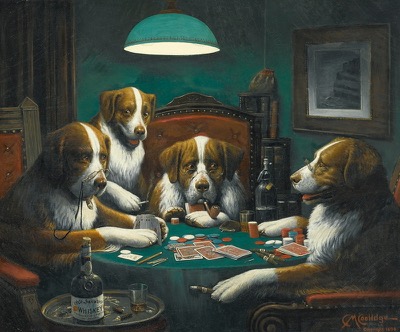
Cassius Marcellus Coolidge: Dogs Playing Poker (1894)
"Action's highly over-rated."
I acknowledge myself to be a dedicated Natterer. I consider most interventions worth deep consideration before engaging in. I'm that old dog that just seems to have to circle the spot where he always lays down before actually plopping down there. I look around before leaping, and might choose not to leap at all after considering. I seem to need to construct a mental model before I begin. I construct a mental model TO begin, for I almost always start my actions that way. Yes, these things take time. Everything seems to take time, so more time doesn't seem to matter to me just as long as I'm productively engaged in some nattering. A small chore, fully considered, might take me until the middle of next week to appear to even start, though I've very likely started nattering about it long before anyone notices any actual action out of me. I might explain that I'm thinking, though I know deep inside me that I'm actually actively nattering instead.
Once I became a world-class Natterer, I found that I'd developed an entire vocabulary to explain myself to any witness to my proceedings, or, more usually, my lack of proceeding.
Smarter

Chen Hongshou: painting of Tao_Yuanming (Ming Dynasty)
"Everyone's Smarter than everyone else."
I used to help facilitate experiential leadership workshops where I'd invite participants to engage in a variety of what I referred to as Silly Little Games. Those games were anything but silly, though they certainly often appeared absurd, at least at first. I'd often ask after an exercise ended, when reflecting upon what had just happened, "How did you exhibit leadership during that exercise?" It became quickly apparent to me by the shocked looks on people's faces when I asked that question that many had not thought they'd exhibited much in the way of leadership during the exercise, and some would readily admit that they'd missed an opportunity to exhibit it, since I had not declared that the purpose of it was to provide a medium for each person to demonstrate leadership. Though we were in the middle of what had been advertised as a leadership workshop, I'd felt no pressing need to re-remind every participant of the workshop's advertised purpose. Besides, I figured individuals could use the experiences for whatever purpose they wanted and I didn't want to hold them hostage to satisfying my needs for them. With a little subsequent prodding, though, almost everyone came to recognize that they'd somehow exhibited leadership however they'd engaged, even the wallflowers, even those who'd taken a bio-break rather than actually engage. We came to rediscover that leadership, whatever that might entail, comes in at least ten thousand different guises and can often only be recognized by the one engaging in it, and then, only if that one's rather generously observing themselves. Influence extends far beyond anyone's senses.
I was thinking about that exercise as I entered a BIG box hardware store yesterday, on a mission to find a tool which I could not describe to myself, much less to any clerk, in the unlikely event that I might encounter a clerk there.
Worser

Edvard Munch: Ashes (1895)
"Our fundamental decency some days seems wasted on the wrong people."
The December 28, 2020 issue of The New Yorker features a thirty-five page essay by Lawrence Wright titled The Plague Year. This reporting should be required reading, for it represents a first draft of a history that seems destined to define our times, like John Hersey's 1946 New Yorker piece, which took up the whole issue, exploring how six survivors experienced the atomic bombing of Hiroshima. Hersey co-opted then current reporting norms by focusing not upon the usual abstractions, but upon the human experiences of six so-called survivors who would never recover. Wright takes a similar tack with Our Damned Pandemic, focusing upon the experiences of a few within the dizzying swirl of unfolding current events. A general sense of impotence emerges as actual experts find their perspectives discounted and discarded in favor of fairy tale public pronouncements and innocents falling prey. Following the nuclear bombing of Japan, a whitewashing occurred, largely by tacit agreement. Correspondents long accustomed to minimizing the horrors they'd witnessed under the firm belief that their readers would not appreciate absolute authenticity, easily accepted often unspoken sanctions against submitting genuinely ugly stories describing truly awful events. Those responsible for informing those not witnessing wore rose-colored glasses when reporting. They'd get the numbers right, more or less, but they figured, I suspect, that depicting the depths of the actual depravity involved wouldn't win them many appreciations. In any society, one at least attempts to uphold a baseline of civility, even when—and probably especially when—unthinkable degradation occurs. Wright avoids this convention.
The Muse's sister, an emeritus professor who taught biology and statistics, has been posting daily updates on This Damned Pandemic since last March, today's update number 315 in an uninterrupted stream attempting to explain whatever was happening and extract meaning from those events.
Coruge

Pieter Lastman: Odysseus and Nausicaa (1619)
"A country that cannot distinguish between Courage and Coruge can only corrupt its purpose."
The Plague Year now passed if not nearly over provided many opportunities for mere mortals to demonstrate extraordinary courage, by which I mean, of course, the perfectly ordinary kind. One doctor, when recounting her first encounters with the COVID-19 virus, explained the dilemma she faced. If she didn't touch the suffocating patient, he would surely die, and he might die anyway. If she did touch him, she might die. She touched him. She and her staff completed their wills and set to work. That's courage. I describe her act so that I might clearly distinguish it from another side-effect of this plague still ravaging us: Coruge. While courage seems fundamentally generous, Coruge seems merely self-important. It takes no courage to refuse to wear the most effective defense against this plague, a mask, it only requires a stubborn self-importance, as if that, in any larger scheme of anything, qualified as in any way important at all. I would call Coruge foolhardiness, but it hardly seems quite hardy enough to qualify. It's merely foolish, a form of arrogance acting out, the insistence of exception to a well-established rule. It's an extension of the more primitive notions of freedom running around these days, the ones that its adherents insist amount to God-given rights to assert whatever they believe to be a right as received wisdom, superior to every other.
I hold no great insight into the nature of Coruge, other than to say that from the distance I maintain, it seems rather pointless and stupid.
Distributing

Albert Bierstadt: The Oregon Trail (1869)
"Whatever else we're intending when Distributing anything, we're Distributing our own naive experience first."
My forebears crossed the much-vaunted Oregon Trail, and try as I might, I cannot quite imagine it as being anything other than a primitive sort of Interstate Freeway. Eye-witness accounts reported a ragged line of discarded furniture, broken wagons, and garbage, alongside an open sewer ditch, with grave markers a frequent sight. Nothing about the trip proved to be nearly as romantic as the paintings of it suggested. Migrants were said to have felt deep disappointment when they saw that their trail would not route them through the Eden the brochures had promised. Even today, we tend to glaze over logistical complications. That pre-pandemic trip to France included an ordeal of airplane connections and discomfiting boredom no entertainment system built into the seat back in front of you could possibly blunt. One arrives half dead in Paris, and spends the first day or two recovering. It's no different for anything we blithely ship. The couple of dozen Christmas packages we mailed took surprising trips, with one pair, addressed to locations less that two miles from each other, arriving four days different. I've had, like you've had, packages routed across the country multiple times and take two weeks to accomplish a standard two-day delivery, with me amusedly tracking 'progress' all the way. Them's the breaks, even with a mature, well-broken-in distribution system. Inefficiency's built right into every one of them.
Wartime's much worse.
Losting

Titian: Diana and Actaeon (1556–1559)
"I'm coming to understand that the purpose of Losting, of learning, is not to get found but to get better at coping with feeling lost."
Feeling lost seems the most reliable indicator that I'm learning. I learned or presumed early that I should avoid feeling lost. I felt embarrassed when introduced to some new concept in school, and attempted, often unsuccessfully, to appear that I immediately understood it. Then, I'd feel ashamed as well as lost. Much later, I came to understand that I'd utterly misunderstood the purpose of school. I'd naively believed that it was about knowing, about demonstrating knowledge, when it was properly understood as being about learning, which might often induce deep feelings of being lost, Losting. Up until about the seventh grade, learning only occasionally induced a sense of Losting in me, for I was a bright lad with strong intuition. Beyond elementary education, though, intuition fails to anticipate much of what's presented, as increasingly complex concepts insist upon deriving answers by employing specific processes. Few intuit algebra. Even fewer accurately anticipate history. These require rather more memory than instinct, and forms of discipline demanding considerable Losting before assimilation occurs. If one favors avoiding experiencing Losting, one loses opportunities for learning many things. Once learned, the Losting diminishes, and I suppose that folks can just lean back on their laurels and cruise. Repeatedly avoid Losting leaves one in a nasty lurch.
A New Year appears and I suspect that I really should be making resolutions as if I was not Losting into it.



